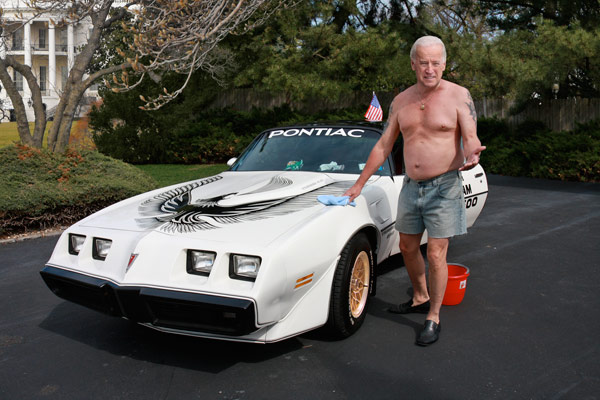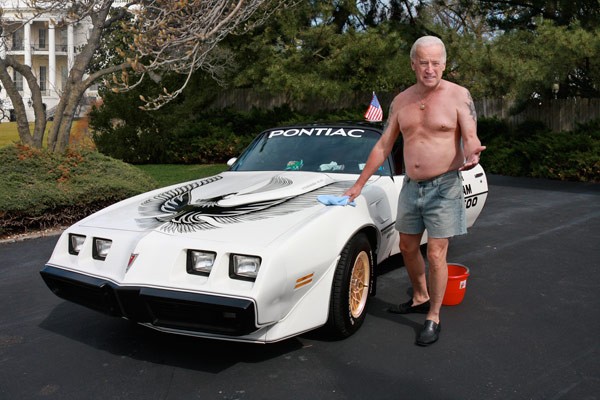By CAROL E. LEE and REID J. EPSTEIN
(DRUDGE) Vice President Joe Biden, who has long been considering a presidential bid, is increasingly leaning toward entering the race if it is still possible he can knit together a competitive campaign at this late date, people familiar with the matter said.
Mr. Biden still could opt to sit out the 2016 race, and he is weighing multiple political, financial and family considerations before making a final decision. But conversations about the possibility were a prominent feature of an August stay in South Carolina and his home in Delaware last week, these people said. A surprise weekend trip to Washington to meet with Sen. Elizabeth Warren (D., Mass.), a darling of the party’s liberal wing, represented a pivot from potential to likely candidate, one Biden supporter said.
“The vice president has not made a decision about his political future,” Biden spokeswoman Kendra Barkoff said. “Anyone speculating that he has made a decision is wrong.”
Mr. Biden would enter as a clear underdog. Polling shows Democratic front-runner Hillary Clinton running far ahead of the vice president, who would be building a campaign team largely from scratch. Mrs. Clinton, who declared her candidacy four months ago, has a robust campaign operation and an outside super PAC raising money on her behalf.
Still, the vice president’s deliberations illustrate how, with just six months before the first presidential nominating contests, both major parties’ campaigns are in a state of flux. Democrats are increasingly insecure about Mrs. Clinton’s candidacy, given her dipping approval ratings and continuing questions about her use of a private email server while secretary of state. Republicans, meanwhile, are struggling to find the proper tone in reacting to Donald Trump, whose no-holds-barred campaign style is dominating coverage of the GOP contest and nudging top contenders into uncomfortable sound bites.
RELATED
Biden Supporters Urge Him to Run
Biden 2016 Bid May Draw Key Voters
Walker’s Immigration Shift Is His Latest Tack to Right
Trump and Bush Duel at Competing Events
“Donald Trump is shaping the contours of the race,” GOP strategist Kevin Madden said. “He’s controlling the tempo of this race and the other campaigns can’t cede that power to him.”
Some party insiders worry Mr. Trump’s hard-line stance on immigration, in particular, has led to unforced errors that could haunt an eventual Republican nominee. In a radio interview last week discussing Mr. Trump’s call for ending “birthright citizenship,” the constitutional guarantee of citizenship for children of immigrants born in the U.S., former Florida Gov. Jeb Bush used the term “anchor babies” to describe the American-born children of undocumented immigrants. Mr. Bush, a fluent Spanish speaker who trumpets his ability to campaign in Latino neighborhoods, later defended his use of a term, which is offensive to many Hispanics.
“Do you have a better term? You give me a better term and I’ll use it,” Mr. Bush said to reporters who pressed him about his language during a campaign stop in New Hampshire.
Mr. Bush, a daily target of Mr. Trump’s attacks, is offering increased pushback against them even though his campaign’s top officials and donors insist Mr. Trump’s campaign isn’t a threat in the primary. The Bush camp on Friday emailed supporters in Alabama, where Mr. Trump held a rally that attracted an estimated 20,000 people, to declare Mr. Trump has “a record that would make Hillary Clinton proud.” The super PAC backing Mr. Bush hired a plane to fly over the event carrying a banner that read, “Trump 4 higher taxes. Jeb 4 prez.”
Mr. Bush is scheduled to appear Monday in McAllen, Texas, to discuss “border security issues,” a spokeswoman said. The campaign said the trip was planned for weeks.
For Wisconsin Gov. Scott Walker, also considered a top contender, the past week has been a lesson in how not to respond to questions about Trump proposals. After the New York developer proposed ending birthright citizenship, Mr. Walker offered three different responses.
First he agreed with Mr. Trump’s proposal, calling it “very similar” to his plan. On Friday, in a CNBC interview, he said, “I’m not taking a position on it one way or the other.” Sunday on ABC, Mr. Walker said he wouldn’t seek to change the birthright citizenship element of the 14th Amendment.
The Wisconsin governor in an interview said his challenge will be picking up other candidates’ supporters as the field thins. “If you’re going to be with Donald Trump, you’re probably already with him. If you’re going to be, for that matter, with George, err, Jeb Bush, you’re probably already with him. For everybody else, the question is to figure out, if candidates drop out…do their supporters go somewhere else?” Mr. Walker said.
Mr. Walker has appeared to suffer the most from Mr. Trump’s rise. Since May, the percentage of Republicans who say they wouldn’t consider supporting the Wisconsin governor has more than doubled, to nearly a quarter of the primary electorate, according to a Vox Populi survey commissioned by the GOP polling firm TargetPoint.
Other Republicans who have sought to engage Mr. Trump have only seen it backfire.
Former Texas Gov. Rick Perry called him “a cancer on conservatism.” Within three weeks, he stopped paying his staff. Sen. Rand Paul of Kentucky challenged Mr. Trump during the party’s first debate and saw his poll numbers sink. Sen. Lindsey Graham of South Carolina got no traction from a fight with Mr. Trump that ended with the businessman revealing Mr. Graham’s cellphone number in public.
Two leading Republican candidates who have escaped the Trump summer relatively unscathed are Ohio Gov. John Kasich and Florida Sen. Marco Rubio. Neither has engaged Mr. Trump or struggled in response to questions about his positions.
“You can’t let other candidates dictate the cadence of the race,” Mr. Rubio’s chief strategist, Terry Sullivan, said. “If you let other candidates do that, you’re losing.” Mr. Kasich, in a phone interview Sunday, said he is determined not to alter his campaign strategy or positions in reaction to Mr. Trump’s rise.
“Pandering is like the worst thing you can do in politics because then you can’t even look yourself in the mirror,” Mr. Kasich said.
For Democrats, Mr. Biden’s meeting with Ms. Warren fueled speculation that he is sounding out support he might receive among those at the party’s progressive base should he seek to challenge Mrs. Clinton. James Smith, a Democratic state representative from South Carolina, said a Biden alliance with Ms. Warren “would be a strong message to primary voters.”
—Peter Nicholas and Patrick O’Connor contributed to this article.
Write to Carol E. Lee at [email protected] and Reid J. Epstein at [email protected]












Sign up on lukeunfiltered.com or to check out our store on thebestpoliticalshirts.com.